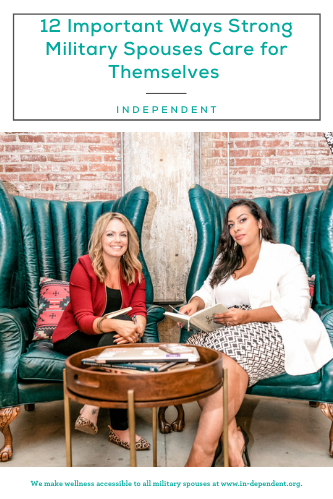There’s often a misconception in the military spouse space that strong spouses don’t need help, they have everything together, they have endless energy and capacity, they are there to hold others up, they don’t burn out or break down. I had the chance to sit down with serial entrepreneurs Moni Jefferson and Flossie Hall of the Association of Military Spouse Entrepreneurs (AMSE) to dispel some of these myths. They are often described as powerhouses. You can see our eye-opening conversation here. Spoiler: they cry, get tired, take breaks, feel misunderstood, and need like-minded friends like the rest of us.
We asked them for three things they’re doing or want to do to look out for their wellness and we added three things of our own. Here are twelve things we do to take care of ourselves.
Moni Jefferson | AMSE
-
Take yearly trips by yourself or with friends for three days.
-
Get moving. Just because you have physical limitations doesn’t mean you have to stay imobile. I have had two chronic issues this year that have been hard for me to want to work out and move but I don’t give up.
-
Quiet time. Pray, meditate, journal.
Flossie Hall | AMSE
-
Sleep. I sleep eight to nine hours every night, no questions asked. My body doesn’t function well without it—mentally, emotionally, or physically
-
Healthy eating. I am very cautious about what I eat. I eat lots of greens, and kombucha and no processed foods or carbs. It makes me feel better and helps negate the lack of traditional exercise I lost when COVID demands kicked in.
-
Sunshine and fresh air. It makes me feel better. The sun is like my fueling source. As long as I can take a few minutes each day to recharge and reboost, it keeps me refreshed and I avoid getting depleted.
Samantha Peterson | InDependent
-
A “normal” sized to-do list. I’m working on tackling less overall, otherwise there’s no humanly possible way. Quit wanting to conquer the world every day—that’s only on Tuesdays.
-
Sit in silence. I’m working on not pushing my body so hard in this season. Instead of power lifting sessions, I’m opting to sit quietly in nature and just relax. It’s astonishingly hard but also rewarding.
-
Stop before I break. I have a problem with saying no to things which often leads to an insane load. Saying no has felt very vulnerable. I’m learning to love those boundaries.
Kimberly Bacso | InDependent
-
Yoga. It’s my constant and it’s often my community. Matching breath with movement helps me feel calm and it gives me a chance to check in with how I’m feeling mentally and physically at the start of the day.
-
Time blocking. I’m not great at it yet, but I’m hoping it will help me know when it’s time to work and that it’s okay to not work all the time.
-
Intuitive eating. I’ve been a yo-yo dieter and a stress eater. I’m working to jump off that train, listen to my body, and stop assigning morality to food choices.
Which ones will you choose to implement to care for yourself?
ABOUT KIMBERLY
Kimberly Bacso exchanged an office with a view for a life of adventure when she became a military spouse in 2001 and a mom in 2004. She is the content director of InDependent, a non-profit on a mission to make wellness accessible to all military spouses. She’s the managing editor of Legacy Magazine, a print publication celebrating military families and the communities that support them. She’s an experienced registered yoga teacher and lifelong vegetarian who can often be found traveling off the beaten path with her husband, daughter, and miniature poodle.













